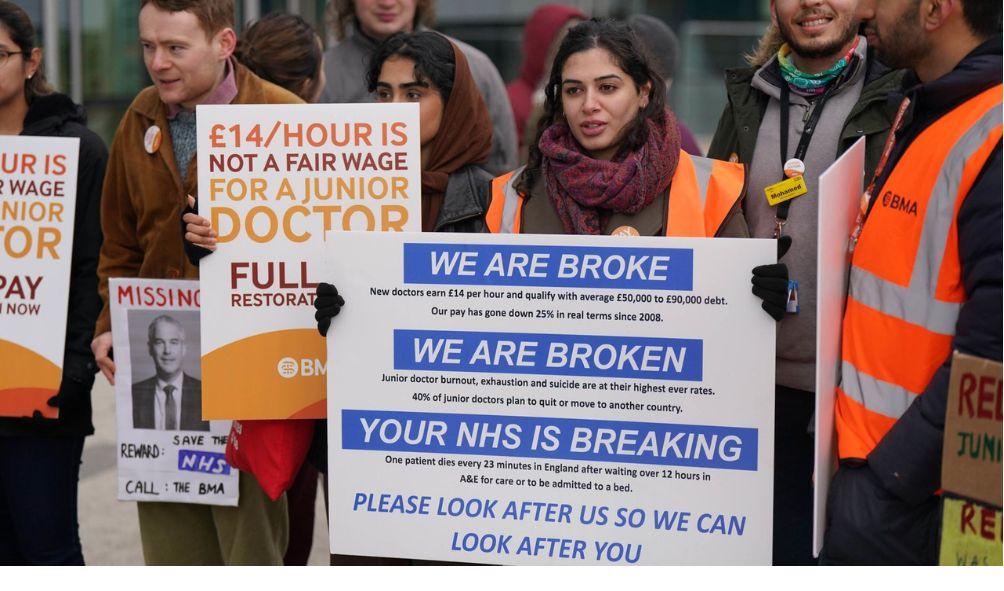NHS Unions Reach 5% Pay Deal with Government.
The NHS unions have reached a pay agreement with the government in a breakthrough intended to end a protracted strike dispute.
The NHS unions have reached a pay agreement with the government, which could signal the end of frontline staff strikes in England.
The offer consists of a one-time payment equal to 2% of the employee’s salary, a 4% COVID recovery bonus for the current fiscal year 2022/23, and a 5% salary increase for the following year, 2023/24.
It will apply to key NHS employees, such as nurses and paramedics, but not to junior doctors, who are engaged in a separate dispute over pay and conditions.
ALSO READ: Nurses announce 48-hour strike in escalating dispute
Steve Barclay, secretary of state for health, stated that a newly-qualified nurse will receive an additional $1,800 this year and $1,300 next year as a result of the agreement.
He stated, “I have the utmost respect for the extraordinary efforts of NHS personnel, including during the pandemic, and the progress they have made in reducing the resulting backlog.
This offer will provide nurses, paramedics, physiotherapists, and other non-medical staff with a fair wage increase while maintaining our commitment to cut inflation in half.
The offer will now be put to a vote by union members, and industrial action will be suspended during this time.
The Royal College of Nursing, GMB, and Unison have stated that they will recommend that their members accept the offer, whereas Unite has stated that it is insufficient.
The unions represent a vast array of healthcare personnel, including nurses, paramedics, 999 call handlers, midwives, security guards, and cleaners.
Sharon Graham, general secretary of Unite, stated that the final decision rests with the members and that strikes will be suspended while they are consulted on the proposed agreement.
She added, however, that United cannot recommend the government’s offer to its members.
“It is evident that this administration does not have the best interests of workers or the NHS in mind. Their conduct and disregard for NHS employees and workers, in general, are evident in their actions.
The British economy is broken, and workers are paying the price.
Other unions were more receptive to the agreement, despite admitting that it was “far from perfect.”
‘Extra 2.5bn put on the table’
The one-off payment, according to Unison, is worth £1,655 for staff at the bottom of the band two (such as porters, cleaners, and healthcare assistants), £2,009 for staff at the top of band five (nurses, midwives, physiotherapists), £2,162 at the top of band six (paramedics, health visitors, senior occupational therapists), and £3,789 for staff at the top of band nine.
Rachel Harrison, GMB National Secretary, described the offer as “reasonable” and a “huge increase for the lowest paid to keep them well above the Real Living Wage.”
She stated that the agreement was reached after the government agreed to provide an additional £2.5 billion to fund the pay raises.
“GMB members have every reason to be proud of themselves. Ms. Harrison added, “It has been a difficult road, but they have prevailed against the Department of Health and obtained what we believe is the best offer that can be obtained at this stage through negotiation.”
She stated that non-pay demands, such as addressing workplace violence, have also made progress.
Pat Cullen, General Secretary and Chief Executive of the RCN, also praised the agreement, stating, “The government was forced into these negotiations and to reopen the pay award as a result of nursing staff’s historic pressure. I believe that members who made the difficult decision to go on strike have been vindicated today.”
Nursing personnel are vindicated
It is unclear how the pay increases will be financed, as the government has previously stated that money for wage increases must come from the budget for frontline services.
Mr. Barclay deferred to the Treasury when questioned about this, stating only that it “would not come from budget areas that affect patients.”
Prime Minister Rishi Sunak also insisted that frontline services will “absolutely not” be impacted by the pay package to end the strikes, but he refused to disclose how the package will be financed.
During a visit to a hospital in south London, the prime minister was asked whether patient care would be compromised. He responded, “Absolutely not. We will protect all frontline services with the £14 billion in additional funding we announced at the end of last year.”
According to him, the agreement is “fair and reasonable” and recognizes the “fantastic” work NHS employees perform while remaining affordable for taxpayers.
He stated, “This is a good example of how this government gets things done and delivers for the British people.”
ALSO READ: Vile Thugs Jailed for Horrendous Alleyway Rape
Unison and Unite members of the ambulance service were scheduled to go on strike next Monday, and physiotherapists were to strike later this month, but these actions have been canceled.
Earlier this month, other strikes involving nurses and paramedics were halted after the government finally agreed to discuss pay.
The dispute centered on a request for an increase for the current fiscal year, which ministers initially insisted was unaffordable.
Before Christmas, tens of thousands of nurses, paramedics, and other healthcare workers went on strike, and they did so again in January and February.
Last month, the government finally agreed to discuss pay, preventing several planned walkouts that would have resulted in the cancellation of thousands more operations.
Following a 72-hour walkout this week, the British Medical Association, which represents junior doctors, has requested that Mr. Barclay meet with them tomorrow to discuss pay.
HEY READER. PLEASE SUPPORT THIS SITE BY CLICKING ADS. DON’T FORGET TO HIT THE NOTIFICATION BELL FOR MORE UPDATES AROUND THE GLOBE.
